1. Déjà vu
“In the year after I arrived, the women described dreams they’d been having, and then eventually, as the pieces fell into place, they came to understand that they were collectively dreaming one dream, and that it wasn’t a dream at all.”
— Women Talking by Miriam Toews
They had no theory. Much less than that--they had no words. There was no learning to draw on, no history to refer to. That would come later. For now, they only knew that they were damaged and that the damage had come while they were dreaming.. Now, together in one room, talking with each other—struggling to describe, fighting with each other (they would have to learn how to fight with the men, would have to learn that they had the right to), laughing over the sharing of secret hatreds and shames and forbidden thoughts that got soothed in the laughter, they started to build a knowledge that would break them from the past and take them into their futures.
This is us I’m talking about, not the movie. It was the early 1970’s, the beginning of what was then known as “Women’s Liberation.” “Consciousness-raising” groups were springing up all over. Living rooms: Chicago, New York, San Francisco, Boston at first, then small towns. We sprawled on the floor, our legs loose, the room filled with cigarette smoke and excitement and fear. Some of us had physical scars. Sharing the emotional damage was harder. We got nasty with each other. We hugged. We got pompous and judgmental. We cried. We peed in our pants from laughing. Some had to leave the room, it was too much for them. Many marriages got broken. Others tightened up. Leaving those marriages was too scary—and there was love in them, too.
You might think it would take an over-thinking feminist to compare Women Talking to a consciousness-raising session among urban, mostly educated women. And in terms of the “facts” which inspired the film (and the novel on which it’s based) there’s very little to compare. The horrendous events of the film actually took place—between 2005-2009, in Bolivia, in a remote fundamentalist Mennonite colony in which the women were not allowed to learn to read or write, and existed essentially to serve the men and their faith. Some 130 of those women (and children), ranging in age from age 3 to 65, had been waking up for years in a semi-stupor, their pajamas ripped, semen and blood on the bed, and often injured (and pregnant, as they would discover later.) They were told it was the work of demons, a plague from a displeased God, or a “wild female imagination.”
The book and film depicts the aftermath of the realization (after two men were caught) that nine men, not God, demons, or “female imagination,” were responsible. A contingent of the women meet. The issue: Do we stay and try to forgive the men? Do we stay and fight? Or do we leave?
The conversation the women have is extraordinary. Despite their lack of book learning, they pretty much cover the ground of every philosophical and religious controversy of existential relevance to their situation. And some sophisticated political ones, too, including the revelation that a “system,” not just flawed or evil individuals is the true “demon” at work.
From the book:
“But wait, says Mariche, aren’t you suggesting that the attackers are as much victims as the victims of the attacks? That all of us, men and women, are victims of the circumstances from which Molotschna has been created? Agata is quiet for a long moment. Then she says, In a sense, yes. So then, says Mariche, even if the court finds them guilty or innocent, they are, after all, innocent? Yes, says Ona, I would say so. Peters said these men are evil, the perpetrators, but that’s not true. It’s the quest for power, on the part of Peters and the elders and on the part of the founders of Molotschna, that is responsible for these attacks, because in their quest for power, they needed to have those they’d have power over, and those people are us. And they have taught this lesson of power to the boys and men of Molotschna, and the boys and men of Molotschna have been excellent students. In that regard.”
As odd as the form of the women’s talk often was, taking place among highly religious women so sheltered from the world, it had a structure and essence I remember well from the early days of Women’s Lib. For want of a better term, I’ll call it “coming into consciousness”—with all that is entailed by that: the sense of waking up to disturbing yet potentially liberating truths, the wrangling over how to “theorize” it all, the moments when that wrangling turns to holding and comforting, the recognition that one can love and also need to leave. There’s a lot of arguing among the women in that barn—we spent a lot of time at that too--but despite the women’s differences of opinion as to what to do, despite their petty excursions into irrelevant disputes, despite their very different personalities, ages, abilities and disabilities, they are deeply, intimately bound together—and those bonds are what allows them, eventually, to leave.
2. Sisterhood is (Still) Powerful
As I was walking back to the car with my husband, having just left the movie theatre where we saw Women Talking. I wondered why despite the extraordinary performances and the beautifully crafted script, I felt oddly detached during the movie.
I realized I was distracted by the fact of it. The fact of a movie, in 2023, metaphorically revisiting the coming-into-consciousness of women that so many of us believed to be accomplished—more or less—several decades ago. But then, it’s not so surprising. Since the election of Trump, preceded by a misogynist campaign that was shocking in its hostility and followed by the stripping away of rights we’d counted on for 50 years, it’s become clearer and clearer that we are far from “post” feminism. Perhaps, in fact, it all needed to be reconstructed again. Once the thought came to me, I couldn’t shake it; it followed me through the viewing and re-viewing of every movie I’d seen in 2022. And it’s through that lens that I’m going to discuss the four films I’m writing about in this piece.
Alice Darling, in its own way, is as much a revisiting as Women Talking--updated, to be sure, to complicate the more simplistic ideas about domestic abuse that we once had. (We know now that visible blood or bruises are not required.) Both films “center” gender (yikes!), in that they focus on the abuses of patriarchal control. In both films, too, women are each other’s rescuers. And both films are unabashedly feminist—in the old-fashioned way, in that they want us to celebrate the bonds between women.
Unlike the women of Molotschna, Alice has not been subjected to any physical abuse, except that which she inflicts on herself, twisting and tearing out bits of her hair, which she then rolls into small clumps. She’s also an obsessive runner, and likely suffers from an eating disorder. Her boyfriend Simon doesn’t beat or rape her; but (and here the women of Molotschna do come to mind) he has convinced her that her demons are the result of her own deficiencies: “Why do you always do this?” he says—it’s not always clear exactly what he’s referring to, but one sees enough of his controlling, belittling treatment to understand why she’s come to think if only she could “do better” (be less selfish, don’t eat food that will make her fat, think of his needs more, stop seeing her oldest girlfriends Tessa and Sophie) everything would be ok.
It’s the most realistic portrait of a psychologically abusive relationship that I’ve ever seen. Alice is obsessed with pleasing Simon, terrified of disappointing him, and imagines that his monitoring of her every moment (she even suspects that he can read her mind) is a function of his love. But that illusion survives only because it reinforces her own shame (“He wouldn’t love me if he knew how bad I am,” she tells her friends, who are appalled.) We don’t know the historical sources of that shame, but the syndrome is chillingly recognizable to any woman who has been drawn into a relationship because of an attentiveness that feels affirming but is in reality suffocating. Alice can’t quite get over the fact that such a handsome, accomplished man would want her, and fights against the recognition that just as she is pulling out clumps of her own hair he is eating away parts of her, bit by bit.
Her girlfriends, though, see that he’s a creep (as we in the audience do too; it’s one of the films accomplishments to have created a character who so convincingly illustrates that creepiness is not always of the Trump variety.) And it’s their relationship with Alice that is the heart of the movie. They are aware that Alice has been acting strangely—constantly checking her phone for messages from Simon, hesitating about going with them to Sophie’s parents lakeside cabin to celebrate Tess’s birthday (a trip she lies to Simon about; he doesn’t like Alice’s friends, who take her attention away from him.) And at the cabin, she’s barely there, preoccupied with leaving before Simon can suspect her lie. While the others eat, enjoy the water, play scrabble, and sing, she’s withdrawn and irritable—and eventually, there is a blow-up between her and Tess, with whom she’s had a rockier relationship than with the more tolerant, even-tempered Sophie. Tess and Alice seem so alienated from each other that the audience may wonder why they’ve been friends all these years.
The answer comes when, after a showdown that dumps them both in the lake, Alice tells Tess that she doesn’t want to go home—the opposite of what she had been saying up until then—and reveals how oppressive her life with Simon actually is. Click!—Tess gets it. And what seemed an unbridgeable gulf between her and Tess is gone. When Sophie returns (she’d been out looking for Alice, who has been spending the day with a search party for a missing local girl) all the grim details about Simon’s behavior and Alice’s guilt come out, and the girlfriends become the dorm-mates they once were, talking, drinking, dancing—a release for Alice that is interrupted when Simon shows up with olives and steak. His presence is jarring. He goes out of his way to perform the attentive boyfriend (“your favorite part, darling,” he coos to Alice, plopping an undercooked piece of meat on her plate); but he can’t sustain the act—and Tess and Sophie aren’t about to fall for it. When he matter-of-factly mentions that the missing girl has been found dead, then puts Alice down for imagining a lipstick she’d found on one of her searches might be of some significance, they shoot glances at each other. And whenever he says something that makes Alice fawn or tremble, they make no effort to hide their recoil.
It’s Tess and Sophie, ultimately, who rescue Alice, in part through direct intervention (no details here, for fear of spoiling a dramatic moment) but mostly by re-awakening her to the pleasures of her body, their bond with each other, the relief of feeling free to say what she thinks, and of being understood and supported. The strength she gains is tentative--in one of the best scenes in the film (suggested by Anna Kendricks, who brought her own experience with psychological abuse to her understanding of Alice), she turns her back on Simon, who is urging her to get in the car and leave, and fixes her gaze on Sophie. She needs that connection, needs it viscerally, in order to keep her resolve.
We don’t know what’s going to happen, any more than we know how the Mennonite women will re-invent their lives. But the future is not what these films are about; they are about women, with each other’s help, becoming empowered. And if that seems like a tired second-wave feminist cliche, recall that not that many years ago, Madeleine Albright, introducing Hillary Clinton at a rally in New Hampshire, was taken severely to task by both Bernie Sanders supporters and the mainstream media when she said that electing the first female commander in chief would be a true revolution, and went on to quote the line that “there’s a special place in hell for women who don’t help other women.”
Albright’s remark, which she had been trotting out at women’s conventions since 2006, was such a feminist chestnut that it had been memorialized on Starbuck’s coffee cups. But Sanders supporters took it very seriously. “Shame on…Madeline Albright for implying that we as women should be voting for a candidate based solely on gender,” the New York Times quoted 23-year-old Sanders supporter Zoe Trimboli. Factually, the notion that Hillary Clinton—probably the most experienced, qualified person to ever run for President—was campaigning only “on her gender,” was ridiculous. But Sanders himself reinforced the notion, frequently mocked by Trump, that Hillary was playing “the woman card”: “‘No-one has ever heard me say, ‘Hey guys, let’s stand together, vote for a man.’ I would never do that, never have.” Many of his female supporters were right there with him:
“I am a woman and a feminist and I will not be taken in by the identity politics that Hillary and her supporters are using to install her in the White House.”
“Sorry that younger folks don't embrace your "woman-at-all-costs" brand of feminism.”
“Frankly, I find nothing more irritating than the concept that it is "time" for a woman in the White House, or that somehow it is Hillary's ‘turn’ to be president.”
“It is ridiculously sexist to vote for Hillary because she's a woman.”
These comments were all addressed to me, after I’d published a piece in support of Clinton—and realized that Trump’s cynical misogyny was being boosted, ironically, by a generational divide among women. Women like me, who had experienced many cultural battles firsthand—from the first scornful comments that journalists had heaped on “women’s libbers” to the public shaming of Anita Hill to the renewed threats to bodily rights that we thought we had won decades earlier—may have winced when Albright quoted a coffee-cup version of feminism. But we understood that behind every seeming corny appeal to “sisterhood” was the history of what was indeed a revolution—and one that was far from accomplished. Younger women, no less feminist, no less committed to gender equality, were eager to distinguish their own politics from ours. We were their mothers—in some cases, their grandmothers—and Sanders encouraged them to cut the apron strings. It was easy for him to make the case with a generation that hadn’t experienced what life was like before Roe versus Wade, or a decade of "culture wars" in which the efforts of feminists to bring histories of gender and race struggle into the educational curriculum were reduced to a species of “political correctness.”
Too, the presence of the Obamas in the White House, while infuriating white supremacists and a political annoyance to the GOP, was deceptively comforting. “This is what a feminist looks like”: Obama proudly held the t-shirt in front of him, and we knew it wasn’t pandering, but for real. You only had to look at and listen to Michelle Obama—or see pictures of Barack and Michelle together, and with their daughters--to know that.
With the Obamas in charge, with reproductive rights still secure for the economically privileged, with the right to marry whomever you loved, and (seemingly) a new cultural permission to be whatever sex (or combination, or none at all) you felt yourself to be, it was easy to imagine that the gender wars were over, and that those who persisted in foregrounding “women’s issues” were relics of the past. As one young Sanders supporter put it:
“Yes, equal rights for women and minorities are critically important. To consider these ideals progressive, however, seems passe. At this point, it's more fair to suggest they are traditional. Gender and civil rights and equality may remain under attack from the right, but these ideals are positively engrained in two generations of Americans.”
Today, in 2023, it’s statements like this, not the idea of women helping other women, that seem like a relic—of a time when too many were living in the collective illusion that we no longer needed champions of our “causes” (as they were often demeaningly labeled by a lazy mainstream media.)
They were so wrong. So very, very wrong.
She Said
It’s one of the best movies of 2022, and in my opinion ought to have been nominated for an Oscar. Perhaps it was seen as too conventional a narrative—this was a year when the academy went for quirkiness and “innovation”—but many of my friends on Facebook found it the best movie of the year. I’d avoided the movie for awhile, worried it would suffer from the same “zero tolerance” that turned #MeToo from a liberating calling-out into a puritanical campaign that didn’t distinguish between a hand around the waist and one shoved into the panties. I was wrong about the movie. Based on the best-selling book by journalists Megan Twohey and Jodi Kantor, it remains focused on their investigation into the truly horrendous behavior of Harvey Weinstein, and doesn’t have one preachy scene. With great performances by Carey Mulligan and Zoe Kazan, it invites obvious comparisons (and contrasts: neither Woodward or Bernstein seem to have wives or children) with All the President’s Men—which is fine by me. They are both terrific movies.
The book—although not the movie—doesn’t end with the publication of their report on Weinstein. It was the right choice for the film. The book, however, goes on to report on the Brett Kavanaugh confirmation hearings—and that was the right choice, too, because although Weinstein got what was long coming to him, the damage done by the Trump years didn’t end with his prison sentence, and good reporters that they are, Twohey and Kantor couldn’t leave readers with a triumphal illusion that now, finally, women’s voices would be taken seriously.
We had thought that once before. When I was sexually harassed by a professor in the 1970s, we didn’t even have a word for it. But the scoffing dismissal of the male students, their pointing out that I “didn’t exactly dress like a nun,” and the chairman’s permission for me to drop the course provided my reason was “personality differences,” all came back when I watched the Hill/Thomas hearings. I wasn’t alone. Sexual harassment became a high-voltage topic of discussion, 1992 was declared the Year of the Woman (yes, we’ve had more than one of those) and a significant number of women (which some called “the Anita Hill Class”) were elected to Congress. The prime-time television series Designing Women even did an openly feminist episode on the hearings, with actual clips of Thomas and Hill and Julie Sugarbaker (Dixie Carter) stormily blasting into the sexism of the senators. Mary Jo (Annie Potts) wears a T-shirt emblazoned with “HE DID IT.”
We thought everything would change. But when in 2019 Supreme Court nominee Brett Kavanaugh defended himself against Christine Blasey Ford’s charge that he had sexually assaulted her at a friend’s house during high school, it was PTSD-time for second-wave feminists. Blasey Ford, if possibly even more reserved than Anita Hill, had come forward reluctantly, and told her account without theatrics. She clearly wasn’t comfortable with the eye of the nation on her, but she was so credible that after her appearance journalists were pronouncing Kavanaugh’s confirmation doomed.
Kavanaugh, however, had learned a few tricks from Clarence Thomas. Claiming, unbelievably, that sex was a topic he never imagined would come up at a judicial confirmation hearing (apparently he was asleep while the rest of us were riveted—as the broadcasters liked to say—to our TVs during the Thomas-Hill hearings), he adopted Clarence Thomas’s playbook as the outraged and aggrieved innocent. Actually, he went even further. While Thomas’s words were full of fury, his performance style was contained. Kavanaugh shouted and sputtered and at various times dissolved into tears as he described the process as a national disgrace, a circus, and a deliberate attempt to destroy him. Though there was no metaphor as potent as Thomas’s “high-tech lynching,” Kavanaugh’s narrative drew on Trump’s own favorite whine: the witch hunt:
You have tried hard. You’ve given it your all. No one can question your efforts. Your coordinated and well-funded efforts to destroy my good name and destroy my family will not drag me out. The vile threats of violence against my family will not drive me out. You may defeat me in the final vote, but you’ll never get me to quit. Never.
I will spare the reader Kavanaugh’s sentimental reminiscences about the calendar he kept during high school, his fondness for beer, the goofy things he did with his friends, the disaster that was his yearbook. Now his life was ruined; he may never be able to coach again, never be able to teach again.
The pretense of a fair trial was possibly even worse with Kavanaugh than with Thomas. When politics are involved, I don’t automatically assume sexual harassment or abuse charges are true. But I do expect them to be investigated thoroughly. “Letting” the woman speak and then trashing her testimony without benefit of such an investigation is a farce. This is just what happened with the Kavanaugh hearing, as an FBI investigation and the calling of witnesses was blocked by the Republican-controlled committee, reducing the proceedings to a “he said/she said” that they made sure Kavanaugh dominated.
As for Trump, I thought “lock her up” and “grab her by the pussy” was as low as Trump could go. I was wrong. He took great delight in mocking Blasey’s failure to remember some details:
“How did you get home? I don’t remember. How’d you get there? I don’t remember. Where is the place? I don’t remember. How many years ago was it? I don’t know. I don’t know. I don’t know. What neighborhood was it in? I don’t know. Where’s the house? I don’t know. Upstairs, downstairs, where was it? I don’t know. I don’t know — but I had one beer. That’s the only thing I remember.””
In a rage, I wrote a Facebook Post called “It’s About Equality, Stupid”:
Imagine Ford as a man accusing a drunk K of holding him down and attempting to rob him at knifepoint in an alley. Would “boys will be boys” be even mentioned? Would the denial of an equally drunk witness be seen as credible? Would the FBI check be allowed to be as cursory?
Let’s say others come forward with similar accusations. Would the senate not feel obliged to check them all out thoroughly? Would we hear about how “unblemished” K’s record is, or how restrained he is in the courtroom? Would the GOP not seriously consider withdrawing his name?
Would K’s frothing-at-the-mouth not have to be seen as at least some evidence of a tendency to inappropriate aggression? Some corroboration that he just might have the wrong “temperament” for the Supreme Court? That he just might not be so “unblemished”?
But attempted robbery is, after all, a crime & we have to take it very seriously. Even the GOP couldn’t get away with the sham FBI “background” probe they slid by. But sexual assault? When the perp is 17 & drunk? & the accuser is just a girl? And hey, she wasn’t even raped!
The fact is that a Christopher Ford would have been treated very differently than Christine Ford. That’s why I don’t like to see us asking to be “heard” or “believed.” It makes it too easy for them to just give us a “voice” (as they did with Ford) and then crap on us anyway.
You can call it “double standards.” I call it failure to treat women as persons. It’s not good enough to be “heard.” It’s equal treatment under the law and in practice that we require—and that we still don’t have.
Happening…Again
The evening of the 2012 election, CNN published a postmortem on “where the GOP went wrong.” The headline read: “How Women Ruled the 2012 Election.” Pointing to the 11% advantage Obama had held over Romney with women and the record number of Senate seats women by women, reporter Halimah Abdullah remarked that “in many ways, the 2012 election was the year of the woman.”
It certainly had looked that way when a fairly innocuous gaffe by Mitt Romney about how he looked for female cabinet prospects by examining “binders full of woman” launched hundreds of comedic parodies, outraged protests, facebook pages, and a devastating rejoinder by Obama. Described in 2013 as “the gaffe that will never die,” many commentators believed at the time of the election that Romney never fully recovered from the “binders full of women” remark.
In 2012, the mainstream media was on high alert, too, about threats to reproductive freedom. They hailed Georgetown law student Sandra Fluke as a heroine when she testified in congress in favor of a federal mandate requiring religiously affiliated institutions (such as universities and hospitals) to offer cover for contraceptives to employees. When Rush Limbaugh called her a “slut” and a “prostitute” who is “having so much sex she can’t afford the contraception,” his remarks set off a firestorm of support for Fluke, and he was eventually forced to apologize for his “insulting word choices.”
In August, Representative Tod Aikin, senate nominee from Missouri, arguing against exceptions for rape victims, said that in instances of “legitimate rape,” women rarely get pregnant: “The female body has ways to try to shut that whole thing down.” He is berated in the press and defeated in the election.
In October, Senate candidate from Indiana Richard Mourdock says during a debate that “Life is a gift from God. And, I think, even in the situation of rape, that it is something that God intended to happen.” He, too, is eviscerated by the press, and defeated in the election.
The same month, Vice-presidential candidate Paul Ryan gives an interview in which, defending his position that there should be no excuses for abortion, refers to rape as a “method of conception.” He is forced to explain that he wasn’t advocating rape as a fertility aid.
None of the media outrage or lost elections caused conservative republicans to quit their efforts to institute state control over women’s bodies. Throughout 2014, conservative legislatures in many states passed a slew of restrictions aimed at making abortion inaccessible even if still technically legal under Roe vs. Wade.
But no one seemed to be paying attention any more in 2016.
Vice-Presidential candidate Mike Pence’s career militating against Planned Parenthood and federal funding for pregnant victims of rape barely rated a mention in the papers or political news shows. Nor did his 2014 bill, requiring that all women seeking an abortion have an ultrasound 18 hours before the procedure.
As for Trump, when MSNBC host Chris Matthews pressured him to give a yes or no answer to the question of whether women who have abortions should be punished, he waffles for a bit, then replies “yes.” When, after the election, “Sixty Minutes”’ Leslie Stahl questioned him about the consequences of a repeal of Roe v. Wade, he waved aside the issue of the effects on women living in states that would outlaw legal abortions: “They’ll have to go to another state” he shrugs.
In 2012, the notion that women who get abortions should be punished or Pence’s proposal for fetal funerals would have ranked, along with Aikin’s and Mourdock’s remarks, as monumentally misogynist mistakes, politically speaking. In 2016, they slid off the candidates into a growing heap of “gaffes” which the press largely ignored, preferring to raise alarms about Hillary Clinton’s emails.
And it wasn’t just the Republicans. When Bernie Sanders described Planned Parenthood and NARAL as “establishment” and abortion as a “social issue” (as though loss of control over ones reproductive life had no impact on ones economic survival), the mainstream media sounded no alarms. Sanders regarded “our” issues as peripheral disturbances to getting out the “real” message of economic inequality. In an interview with Rachel Maddow, he described the fight for reproductive rights as a distraction from “serious issues.” That hadn’t much changed by 2017 when he supported anti-choice Nebraska mayoral candidate Heath Mello, arguing that “you just can’t exclude people who disagree with us on one issue.” One issue?
So now, in 2023, we have to do it all over again. Except this time, feminist generations no longer seem as divided as they were in 2016. And symbolic coat-hangers on signs demanding “choice” are no longer enough. This isn’t about choosing which pair of jeans to wear. And it isn’t “one issue,” but has impact on every aspect of women’s lives. We’re talking about justice and equality, and are unwilling to spend a whole lot of time defending ourselves against the notion that we are “pro-abortion.” And even the fiercest feminist defenders of Sanders now realize that there was a whole lot more at stake in that election than “electing a woman just because she’s a woman.” They may not say so openly, but they know.
Still, what women’s lives will be like if we don’t win this war remains an abstraction for those who have yet to experience first-hand the deprivation of reproductive freedom and access. The urgency of turning the “issue” into un-euphemistic concreteness is what compelled Annie Ernaux to write about her own experience in the early sixties, when abortion was illegal in France (and the United States.) She produced a harrowing memoir, which has since been made into a gripping film which is almost as harrowing. In one scene, we watch as Annie inserts a knitting needle into her vagina, trying to induce an abortion herself, having been unable to find a doctor who would help. (Actually, “not helping” is putting it mildly; one prescribes something that she thinks will bring on her period, but turns out to have been the opposite: a preventative to miscarriage) Later, after finding a doctor who is willing to insert abortion-inducing probes, she does finally succeed in terminating her pregnancy—and almost dies afterward. She also has to endure the horror of watching the dead fetus drop from her body. A friend (called “O” in the book) cuts the chord. From the book:
We don’t know what to do with the foetus. O goes to her room to fetch an empty melba toast wrapper and I slip it inside. I walk to the bathroom with the bag. It feels like a stone inside. I turn the bag upside down above the bowl. I pull the chain….
…Nothing about her bourgeois ideals or her beliefs had prepared O to sever the umbilical cord of a three-month-old foetus. Today she may have dismissed this episode as a temporary aberration, an inexplicable moment of chaos in her life. She may also hold anti-abortion views. But it was she, and she alone, who stood by my side that night, her small face crumpled with tears, acting as an improvised midwife in room 17 of the girls’ dormitory. I was losing blood. At first I didn’t take any notice, I was certain everything was over. Blood was gushing from the severed cord in spurts. I lay motionless on the bed; O kept handing me towels that soaked up the blood in no time…. I tried to stand up and saw stars; I thought I was going to die of a hemorrhage. I screamed at O that I needed a doctor immediately. She went downstairs to wake up the janitor but there was no answer. Then I heard voices. I was convinced that I had already lost far too much blood. The arrival of the doctor on night duty heralded the second part of the night. Sheer experience of life and death gave way to exposure and judgement. He sat down on my bed and grabbed my chin: “Why did you do it? How did you do it? Answer me!” His glaring eyes bore into me. I begged him not to let me die. “Look at me! Promise me you’ll never do it again! Never!” Because of his wild expression, I believed he might actually let me die if I didn’t promise.”
The book spares us nothing. And the film is only marginally less excruciating in its details. Because it is visually enacted, the impulse to turn away, especially from the scenes I’ve described, is strong. But turning away is exactly what Ernaux does not want us to do. The act of writing about her experience is precisely to make us look:
“I realize [my] account may exasperate or repel some readers; it may also be branded as distasteful. I believe that any experience, whatever its nature, has the inalienable right to be chronicled. There is no such thing as a lesser truth. Moreover, if I failed to go through with this undertaking [SB: writing the book], I would be guilty of silencing the lives of women and condoning a world governed by male supremacy.”
Male supremacy. It’s the kind of language that was mocked by Trumpsters in 2016, the kind of language that was scorned by Sanders supporters as a second-wave relic.
After the blatant sexism of the campaigns against Hillary (including the one conducted by the “liberal” media), after Kavanaugh, after Dobbs…it doesn’t seem quite so antique.
There are a number of films that have been nominated for this year’s Oscars—Happening is not among the nominated, although it’s a far more important movie than many of them—that have upsetting, even nauseating, imagery. I’ll talk about them in another piece. Compared to Happening, those images seem gratuitous, put there deliberately to startle or shock. They aren’t integral to the narratives, or to whatever commentary—on class or whatever—the film is offering. The opposite is true of Happening. It’s meant to wake up those who are still asleep, imagining—like the SCOTUS justices who argued that “safe haven” laws allowing women to drop their infants off at churches would take care of the problem of unwanted pregnancy—that women’s bodies are merely incubators of future life.
Happening is not a feel-good movie. These are not feel-good times.
***************
For more on the 2016 election, see my book The Destruction of Hillary Clinton
And if you’re interested in learning more about me and my work on the issues discussed in this piece and others, see my website: https://bordocrossings.com
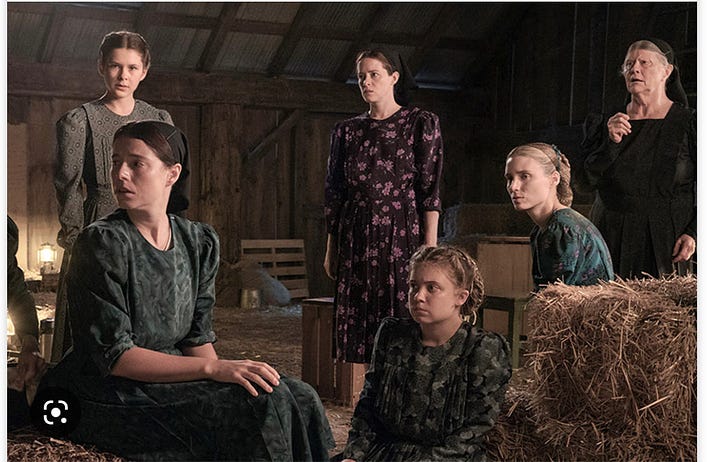
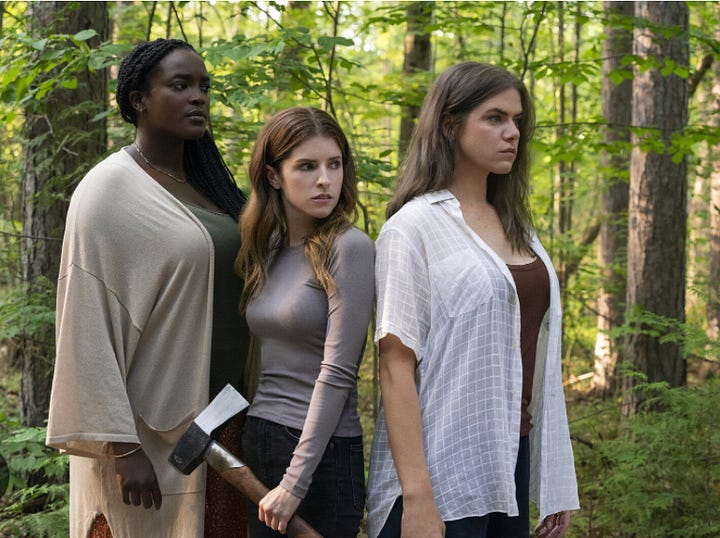

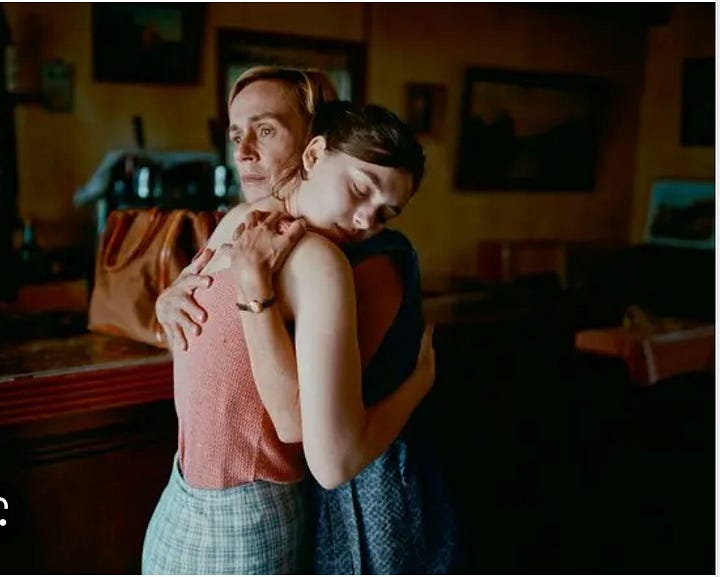
Women Talking was written and directed by Sarah Polley. It is based on the 2018 novel of the same name by Miriam Toews. It stars Rooney Mara, Claire Foy, Jessie Buckley, Judith Ivey, Ben Whishaw, and Frances McDormand, who is also a producer on the film.
Alice, Darling was directed by Mary Nighy, in her directorial debut, from a screenplay by Alanna Francis. The film stars Anna Kendrick, Kaniehtiio Horn, Charlie Carrick, and Wunmi Mosaku.
She Said was directed by Maria Schrader and written by Rebecca Lenkiewicz, based on the 2019 book of the same title by reporters Jodi Kantor and Megan Twohey. The film stars Carey Mulligan and Zoe Kazan as Twohey and Kantor, respectively. Patricia Clarkson, Andre Braugher, Jennifer Ehle, and Samantha Morton co-star, with Ashley Judd appearing as herself.
Happening (French: L'Événement) was directed by Audrey Diwan from a screenplay by Diwan and Marcia Romano. It is based on the 2000 novel of the same name by Annie Ernaux. The film stars Anamaria Vartolomei and Luàna Bajrami.




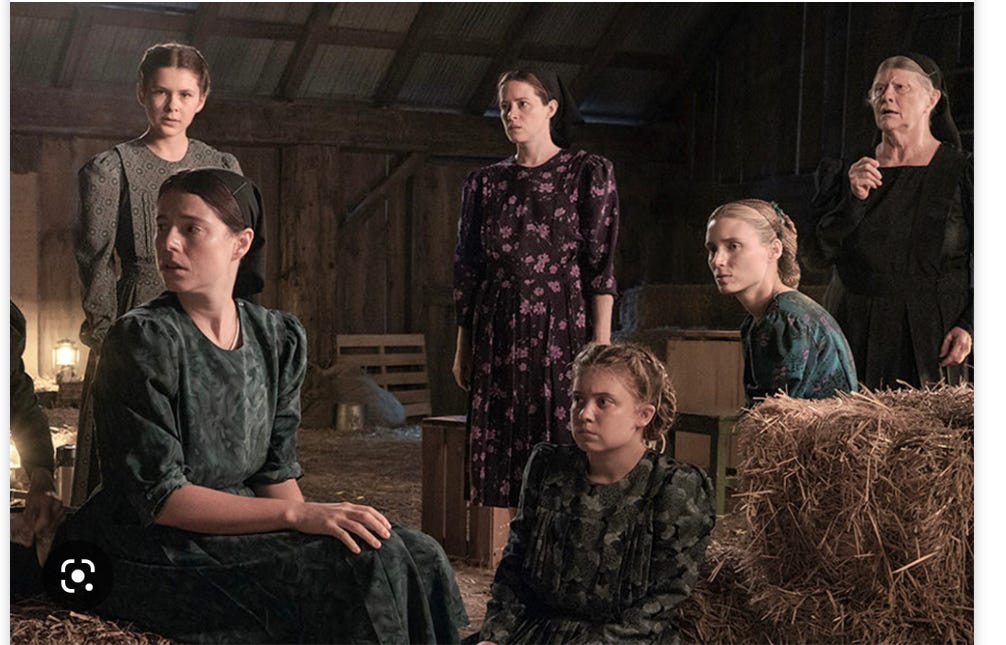
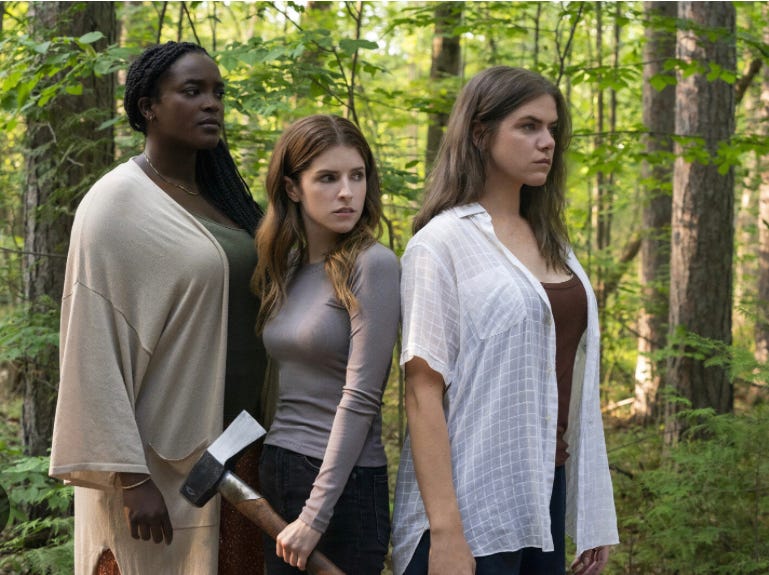

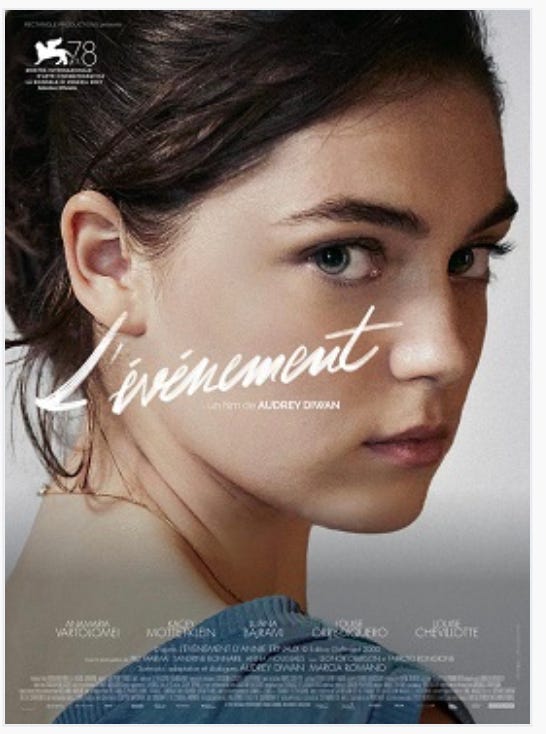
As a woman who was having babies pre-feminism and has been fighting this fight ever since Betty Friedan and the grand awakening, all I can say is Bravo. Thank you. Thank the women who lived it, the women who produced and starred in those movies. Thank the women who carry on. My daughters, my nieces, and my granddaughter are carrying on.
We will never go back.
Excellent Susan. Thank you for all of these reminders, for the context, for the focus on these films.